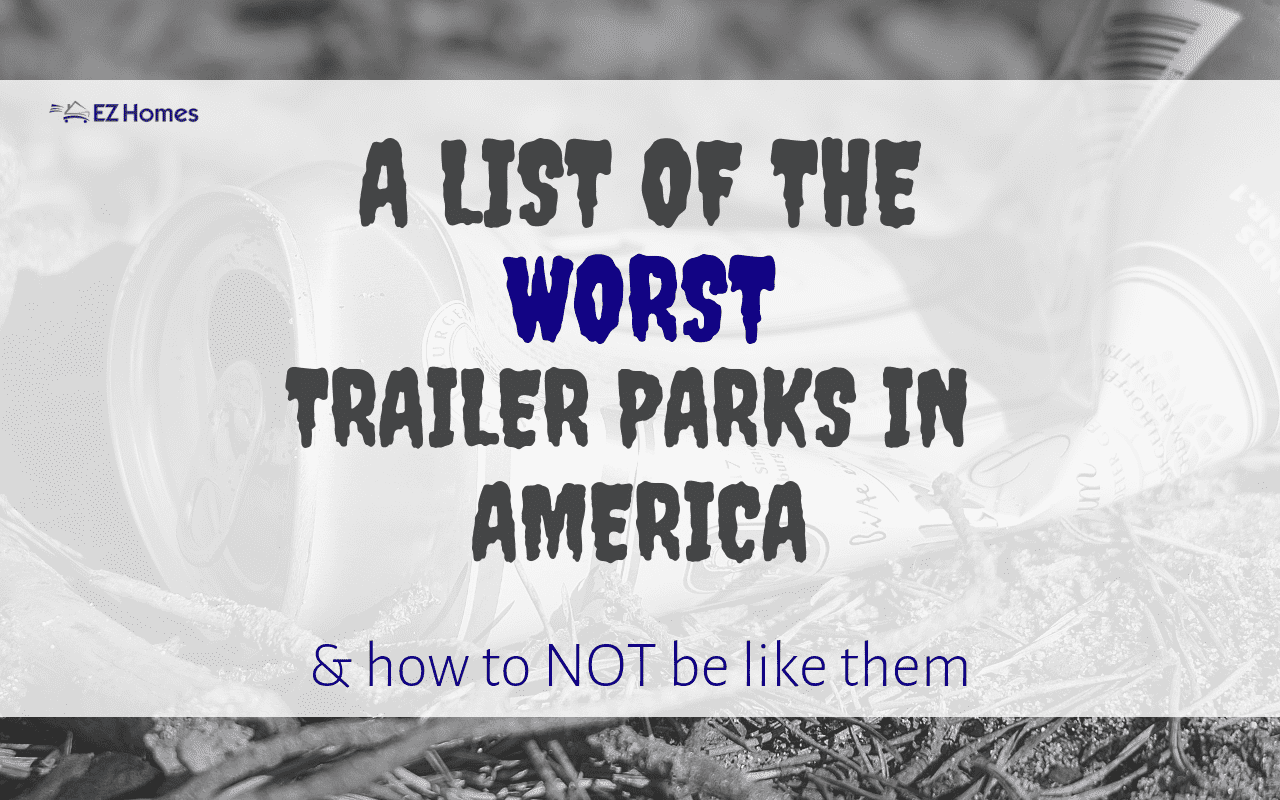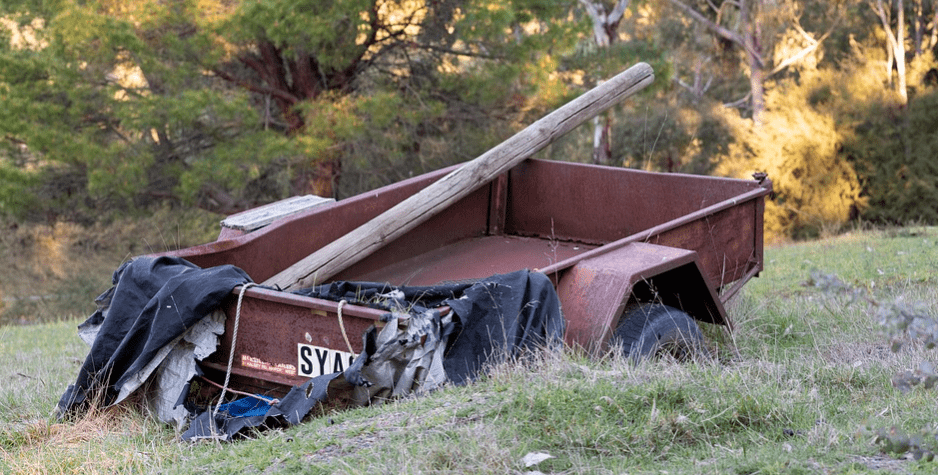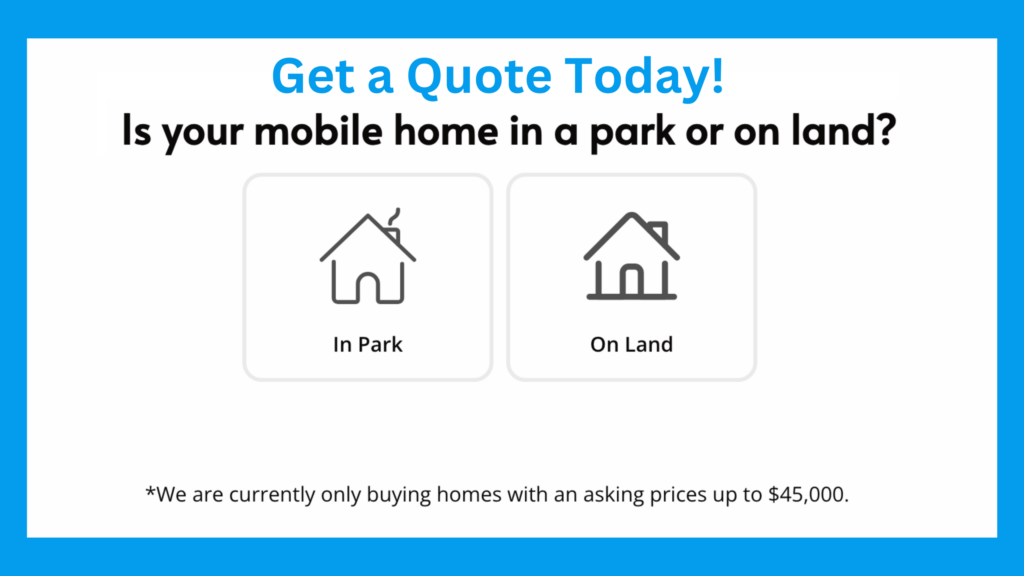Let’s not kid ourselves. Trailer parks have had a pretty bad reputation. Over time, mobile home park living has grown and diversified to offer a range of living experiences for people with different budgets and different needs. But there are still some parks that perpetuate the negative perceptions we have of trailer parks.
This makes it harder for decent, professional, and modern trailer parks to shake off these stereotypes and for the industry as a whole to thrive.

While the goal of this article is not to call out specific mobile home parks, we do want to draw attention to what goes wrong in the worst trailer parks in America. Additionally, what the consequences are and what you can do to not end up in the same boat.
Some of the worst trailer parks in America
Northern Mobile Home Park – Schofield
As far back as 2016 reports started surfacing surrounding the atrocious conditions of the mobile homes in this park located near Schofield, Wisconsin. Some of the problems at the park included:
- heaps of undisposed trash
- broken windows
- hazardous stoops
- leaking gas lines
- and illegal wiring.
With mobile homes, fire is always a huge concern which is why there are strict guidelines in the HUD Code for fire safety. Multiple tenants reported narrowly escaping potentially fatal home fires caused by this illegal wiring and leaking gas. It’s also safe to assume that the fire alarms and other fire safety measures may no longer be active in these homes.
The city of Schofield finally sprung into action in 2017. The park management was sent a list of 350 code violations that needed to be addressed or the park would lose its license. Also, the court case has dragged on until now, leaving residents with an uncertain future. They are currently awaiting a ruling on the appeal brought by the property after initially being told to leave by August the 1st, 2018. You can read more about the ongoing case here.
19th Street and Mobile Avenue – Tampa
This park is great… or should we say terrible? It is an example of how cutting costs and neglecting on maintenance can soon snowball out of control. With its current condition, this park is utterly beyond salvation and has just become a drain on its owner, the city, and a general nuisance. Currently, the city is in the process of trying to get the land to be transferred from the owner as well as recover some of their losses and liens on the property.
Code violations are on record since around October 2011. Most of these are attributed to typical problems with mobile homes that start out very small and balloon in severity with time. These include:
- leaking roofs
- cracks and holes in the walls
- broken or missing windows and doors
- mold
- faulty wiring
- etc…
When identified and taken care of early, they are very inexpensive and quick fixes. However, left alone, they can cripple a home over time.
Regrettably an unwanted and unattractive site
Slowly but surely, these issues drove out current and new residents until the park became the “ghost park” that it is now. Of course, as the tenants left, the money dried up even further to do these much-needed repairs. As there is no one to take care of the lots, the property itself is also unattended and overgrown with weeds.

Now, the park is nothing but an uninhabited eyesore. It has become both a fire hazard and a pest-magnet that the city, its residents, and everyone else is calling for to simply be destroyed.
Various parks – Tucson
We wanted to conclude this list with what is actually an inspiring story. And one we felt worth sharing.
Marylan Tran, a second generation Vietnamese in the U.S. and an ex-nun, has been buying old and run down mobile home parks. She revamps them and leases out the properties in the Tucson area. In fact, Tuscon.com ran a great piece on the story.
Some of these parks were in appalling conditions before they caught her attention. They had trailers so degraded they were beyond repair and unfit to live in. Not to mention clogged sewers and worn-out or non-existent utilities. One of the issues that exasperated the plights of these parks was that they served lower-income communities.
Marylan Tran not only wanted to create better-living conditions within these parks but also keep them affordable. With the money she got from selling her house in California, she started:
- buying these parks
- replacing the units that had to be replaced
- upgrading the utilities
- made sure the homes were up to code regarding insulation, safety, etc.
She admits that it’s not an easy job and that it can be both stressful and tiring. However, she has managed to improve the living conditions of the parks, provide low-income housing, and run a stable and profitable business.
How not to be like them
Maintenance is key
Considering some of the horror stories above and some of our own prejudices, you might be surprised to know that maintenance requirements and costs are much lower for a mobile home park than for a real estate development. In fact, lower maintenance costs are one of the main reasons why newly bought mobile home parks have a higher ROI than newly bought real estate communities.
There are a few reasons for this:
- Mobile home materials are generally much cheaper than real estate building materials. If you think about it, fixing or replacing wood/vinyl/metal sheets instead of having to rebuild an entire brick wall is obviously way more economical.
- Similarly, it’s often much simpler to fix mobile homes. You don’t need to demolish and reconstruct certain parts to get into the cavities inside of floors/ceilings/walls. As mobile homes are lifted, it’s also much easier to reach the crucial plumbing and other systems below them.
Lack of maintenance will negatively affect your mobile home park
However, this does come with a caveat. Mobile homes are also way more susceptible to small problems that may seem innocuous at first but can develop into much larger issues. For example, mobile homes “settle” into place and are affected by the elements which can cause them to bend, expand, contract, etc.
These can lead to small cracks developing in the walls, roof, in corners, door and window frames, and even the flooring. Because they consist largely of wood, they are also always under threat from water damage. All of these can start off small but end up crippling a home if left untreated for decades.
Many new mobile home park owners make the mistake of thinking that it will be easy to take care of running the park and its maintenance. However, this constant need for small fixes can soon overwhelm owner-managers until they resign themselves to forever being behind. Therefore rather opt to lower their standards.
Get extra help if needed
That’s why we recommend having a dedicated maintenance manager for a park with more than 20 units. Trust us- it’s in the best interest of everyone involved. Even if you are a full-time manager. This is one of those things where the economic benefits might not be evident at first. In fact, it will often seem like a drain.
However, it pays off hugely to have a well-maintained park with functioning and attractive units fit for human occupation.

We’ve put together a great article with Tips For DIY Repairs & Maintenance in Your Mobile Home Park.
2. Replace old homes
One of the consequences of not diligently maintaining homes in a mobile home park is that they fall so badly into disrepair that they become uninhabitable. No matter how desperate people are. Not only can this get you into legal trouble, but from that moment the home will become a drain on your park.
It only takes one unit that’s falling to pieces to seriously dent how people, both within and out, perceive your park. If you have a few, you will soon be seen by the community as just another example of how trailer parks are a blemish on the area. Unfortunately, it will then feed into the typical stereotype. Ideally, it should never come to this. But if it does, it’s best to scrape together the money and replace a unit than let it ruin your whole park.
Be sure to keep these as reminders under your belt
One reason owners are understandably loathed to do this is due to how expensive it could be, potentially. Sure, mobile homes are much cheaper than the average house at around $40,000 for a second-hand model and around $70,000 for a brand new double-wide. However, just the task of moving it to the park could cost another $10,000-$20,000 extra. That’s not including a bunch of headaches in the process, too!
Because of poor financial management, or plain greed, many park owners never make this step and simply leave a dilapidated mobile home to rot on their premises. If you start to rack up what this home really costs you, it’s clear that it makes sense to try your best to make the reinvestment in your park:
- You are losing out on the potential rent for both the lot and the unit. An estimate can be anywhere between $300-$700 on average in most parks.
- It would be hard to explain future rent increases if you have these “eyesores” in your park.
- People are less likely to join your park because they will either be concerned about your lack of maintenance or the current condition of the park.
- You could lose current tenants who don’t want to stay in or near such homes.
Last, but not least, these homes can also be hazardous as they become a playground for kids. They may attract rodents and other critters and be a fire risk.
3. Financial health can’t be understated
One of the big issues with many mobile home parks today is that they were owned by amateurs or mom-and-pop owners. Moreover, they probably never had the proper know-how accounting or drive to run the park properly and professionally. This means that they never took care of their finances. Essentially, it leads to inconsistent and usually: underperforming rent collection, rents falling behind market rates, and general financial mismanagement. All due to a lack of priorities.
Although it isn’t always the case, it’s prevalent if you look at stories of failed mobile home parks. Often the inability to keep up maintenance or to replace units simply stem from the fact that there are no finances available. Or perhaps it’s because of inconsistent cash flow.
As a mobile home park owner, responsibilities are priorities
Many park owners are slow to raise the rent. Perhaps it’s because of being naive of the market conditions, being too lazy to go through the effort, or because of a genuine sense of responsibility in keeping the park affordable. However, to run a business, you sometimes need to be cool and calculative. If you are worried about some residents not being able to pay rent, think of where the rest of your residents will be if the park is forced to close. What if you can no longer provide a proper standard of living?
In fact, one of the first things that new park owners do when they buy a mobile home park is to raise the rent as it’s often 20 or more years behind. Remember- the constant rise of inflation costs also includes the costs of running a mobile home park. You simply have to increase rent to stay afloat year after year. No matter how you feel about it.
Yes, running a financially healthy park may mean sometimes taking a hard stance with residents and evicting tenants when necessary and legal. However, your park has a very uncertain future if you don’t keep your mainstream of revenue flowing strongly.

A better mobile home park is achievable
A failure to apply those three tips is one of the main reasons why mobile home parks slowly degenerate over time, leading to them falling into disrepair, and ultimately, being a sinking ship. Diligence is what will keep your park from becoming one of the worst trailer parks in America. No one wants to be in this situation as it can ultimately become nothing but a liability against you, the community, and the authorities.
So, the big takeaway from this article is to always be proactive in how you manage and maintain your park. Having a “devil-may-die” attitude could lead to an unstoppable snowball effect in the long run. If you want some help to keep running your park like a tight ship, you should routinely make sure that your manufactured home park is safe and complaint.



